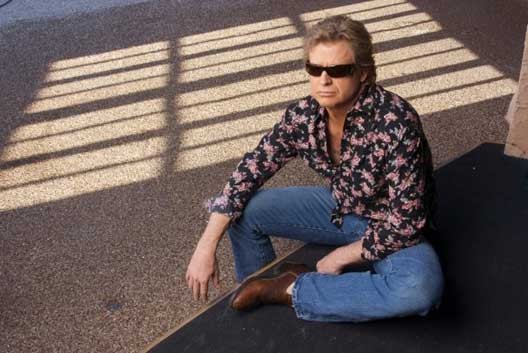Let’s just get it out of the way right up front: In the five years between his last and most successful album yet, Good Times, and his new Dualtone Records release, Beautiful Day, Charlie Robison got divorced from his wife Emily (of The Dixie Chicks). So it’s only natural to assume that this is his “divorce album,” which is not altogether untrue. But as with all devoted songwriters, Robison writes from a perspective that draws from and speaks to larger matters and issues within human experience and life in these times. And as the title indicates, even if this album is to a notable degree about and informed by the end of his marriage, there’s something different and more at work here. Beautiful Day is ultimately an album that chronicles the processes and resulting growth one goes through and finally the redemption to be found within such a major life event. And it reflects a change in approach is the way Robison writes his songs. “In the past most of my songs were stories written from a third-person perspective,” he explains. “This is the first album where I’m writing in the first person. It wasn’t like I did it by design; I didn’t have any choice.” Hence Beautiful Day is a musical and emotional journey that travels through a vivid landscape of feelings and moods from certain places to other ones new and wholly different. Like such certified classics as Bob Dylan’s Blood on the Tracks and Willie Nelson’s Phases & Stages, its narrative center is the end of Robison’s marriage. Yet unlike too many divorces, where rancor and pointed anger is a key part of the mix of feelings, this story is one of two people who love each other and their children, but due to their situations, themselves and the demands of their careers, the marriage is no longer tenable. And that’s what makes Beautiful Day another significant creative work about divorce with a different tale to tell than any other. Robison’s divorce, which was finalized in August of last year, is by no means typical. “It was a completely amicable thing,” he explains. “We didn’t even have separate lawyers. We did the whole thing ourselves, and we get along better now than we had the last four years of our marriage. We hang out all the time,” he notes. The distinctly different nature of this break-up is clear from the opening title track, with its upbeat vibe, tempo and theme, albeit tinted with a slightly sardonic edge. And by the time one reaches the final number, Robison’s decidedly Texan reading of Bruce Springsteen’s classic “Racing in the Streets,” an exhilarating sense of freedom and new beginnings is at hand. In between one finds such compelling new Robison compositions as the psychedelically tinged “Yellow Blues,” the upbeat and spry “Feelin’ Good,” the emotionally stormy “If The Rain Don’t Stop,” the somber “Middle of the Night” and the kicking country-rock hoedown of “She’s So Fine.” As with his last album, Robison includes two numbers by one of his favorite songwriters, Keith Gattis, “Down Again” and “Reconsider,” both of which fit the album’s theme perfectly, as does Bobby Bare Jr.’s “Nothin’ Better to Do.” All told, it’s an album that takes the listener through a gamut of feelings that by its end leaves one wiser and more mature as well as wonderfully entertained. Throughout his career, Charlie Robison has forged his own path within the country music world as well as the Lone Star music scene and popular music at large. He grew up in the small scenic town of Bandera in the Texas Hill country — known as “The Cowboy Capital of the World” — where his family has ranched the land for eight generations. Music wasn’t just a staple around the Robison household; from even before he could walk, Charlie would spend Saturday nights with his parents at The Cabaret, the local C&W dancehall in downtown Bandera. But the fare playing in the family home ran the gamut from rock’n’roll to singer-songwriters and much more. So it should come as no surprise that Charlie, his brother Bruce and sister Robyn Ludwyck all enjoy respected and critically acclaimed music careers as singers, songwriters and recording and performing artists. While attending college at Southwestern Texas State University — now known as Texas State University, and the alma mater of George Strait and many other musicians on the Lone Star scene — Robison found he wasn’t cut out for academics, and a long held desire to try his hand at making music came bubbling to the surface. He managed to persuade his brother Bruce to also drop out of college, and the two headed to Austin. The brothers Robison soon both landed in the band Chaparral, which in the late 1980s was a seminal act that seduced young generations of Texas to hit the dance floor to two-step, waltz and more, arm in arm in the old-school style, to a new sounds and style within the greater realms of country. It was ground zero for what became a thriving Austin scene rich with emerging talent by the 1990s. Charlie began writing songs in earnest, and after a stint in the popular Austin roots rocking combo Two Hoots and A Holler as well as a collection of local talents know as The Millionaire Playboys, he struck out on his own as an artist. His 1995 debut album, aptly titled Bandera and released on the tiny Austin Vireo Records label, was a potent opening salvo that included such Robison favorites as the rowdy nightlife celebration “Barlight” and “Red Letter Day.” After a brief deal with a Nashville major label that ended because of his refusal to be artistically boxed-in and packaged as the latest hunky hat act, he signed with Sony Music’s Lucky Dog label and released two studio albums (1998’s Life of the Party and 2001’s Step Right Up, which hit the Top 40 of the country album chart) as well as two live recordings: Unleashed Live with brother Bruce and labelmate Jack Ingram from a tour the three did together and his own 2003 Live album that showcased Robison’s dynamic and hard-charging performing style which has made him a Lone Star State favorite and a popular national country-rock attraction. In what now may seem rather ironic, Robison’s 2004 Dualtone label debut, Good Times, found him celebrating wedded and domestic contentment as a husband and father (of son Gus and twins Juliana and Henry). It enjoyed the best record sales of his career, and the video for "El Cerrito Place" was a Top 10 hit at CMT. Beautiful Day promises to build upon and expand Robison’s public impact even further. But even if his divorce was amicable, the experience still wasn’t an easy one for him, as the end of any profound love is bound to be. “When I was writing this record, I was going through the quintessential divorce thing of living in a one-bedroom apartment in downtown San Antonio across from the bus station,” Robison recalls. “When it’s over, it’s over.” Beautiful Day captures the panoply of feelings one experiences with the break-up of a marriage. “It goes through the range from, man, this sucks worse than anything in the whole world to, man, I’m really pulling out of this and really feel good. I’d be up and write a redemptive song like ‘Beautiful Day’ or ‘Feelin’ Good.’ And then I’d write something like ‘If the Rain Don’t Come Today,’ where the guy in the song wants to go out and have fun tonight, and then it fades into the reality of where you’re at on ‘In the Middle of the Night.’ You’re by yourself and you don’t feel as good as you did earlier. But I still tried to give it that Sinatra twist where even if it feels lonely and bleak, a girl walks in at the end, and you think, well, maybe my life isn’t quite over yet.” Despite the high-profile fame of The Dixie Chicks, the Robisons managed to keep their separation and divorce out of the tabloids and gossip columns. “Although the order of the songs on the album is more musical than following any storyline, as you hear the record you’ll know what was going on with the divorce,” Charlie admits. Beautiful Day is also a musical departure for Robison as his first self-produced album, recorded at his brother Bruce’s Austin studio, Premium Recording Service. The vibrant electric guitar work throughout is by artist in his own right as well as producer Charlie Sexton, while the acoustic guitars that fill out the sound are by Robert Earl Keen’s guitarist and producer Rich Brotherton. Longtime Robison sideman Kim Deschamps brings the colors of his steel guitar and mandolin to the mix, while the bottom end is held down with grooving solidity by the veteran rhythm section of Robison’s backing band The Enablers, bassist Scott Esbeck and drummer Keith Robinson. “I’ve wanted for a long time to make a record that sounds like a great American rock band,” explains Robison. And just as Beautiful Day closes one emotional chapter in his life and opens another, it’s also an album on which his always strong rock’n’roll leanings come to the fore to transcend his country roots, while also bringing them along, to create a sound that is simply great American music. All told, it’s an album of deep and rich emotional and musical content that anyone who has ever lived, loved and lost can find themselves within as well as experience what Charlie Robison has been through. And all of us, the artist included, find a redemption and the prospect of new beginnings by the time the record ends, and find ourselves better, wiser and stronger thanks to it all.
| Date |
Venue |
City |
State |
Note |
| No Tour Dates Available |
01/31/2011 - Charlie Robison rocks out at Banita Creek -
Read More
10/12/2010 - Bandera Music Hall of Fame induction this Sunday -
Read More
08/05/2009 - Break up painful but inspiring for Charlie Robison -
Read More
06/21/2009 - From a stormy time springs a "Beautiful Day" -
Read More








 Total Reviews: 158
Total Reviews: 158
















































